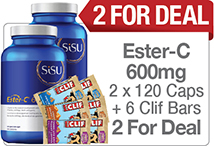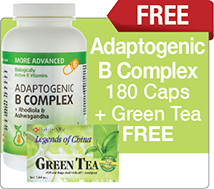Gluten Intolerance Support Supplements
Enhance Wellness with Gluten Intolerance Supplements
Gluten is a combination of two proteins – gliadin and glutenin – commonly found in the endosperm (the inside) of certain grains, predominantly wheat, barley, and rye. It is crucial in providing elasticity and structure to the dough, so it is commonly found in many types of bread, pasta, and other baked goods. Unfortunately, some individuals have an intolerance or an allergy to gluten, varying from mild to severe. Read more >-
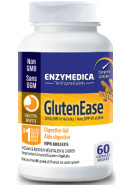 SUPPORT FOR THOSE SUFFERING FROM GLUTEN INTOLERANCE. Enzymedica's GlutenEase contains a unique combination of proteases for digesting gluten and casein. GlutenEase addresses issues that also stems from gluten intolerance; problems digesting the carbohydrates of offending foods. For this reason, GlutenEase also contains Amylase Thera-B...SUPPORT FOR THOSE SUFFERING FROM GLUTEN INTOLERANCE. Enzymedica's GlutenEase contains a unique combination of proteases for digesting gluten and casein. GlutenEase addresses issues that also stems from gluten intolerance; problems digesting the carbohydrates of offending foods. For this reason, GlutenEase also contains Amylase Thera-Blend and Glucoamylase which assist the digestion of the carbohydrate portion of grains (such as wheat) which often contain gluten. Enzymedica's great enzyme combination proactively supports the gut, allowing proteins to be properly broken down and absorbed in their digested state, broadening the potential food groups a person may eat. [CAPS]+ Earn 32 Reward Points
SUPPORT FOR THOSE SUFFERING FROM GLUTEN INTOLERANCE. Enzymedica's GlutenEase contains a unique combination of proteases for digesting gluten and casein. GlutenEase addresses issues that also stems from gluten intolerance; problems digesting the carbohydrates of offending foods. For this reason, GlutenEase also contains Amylase Thera-B...SUPPORT FOR THOSE SUFFERING FROM GLUTEN INTOLERANCE. Enzymedica's GlutenEase contains a unique combination of proteases for digesting gluten and casein. GlutenEase addresses issues that also stems from gluten intolerance; problems digesting the carbohydrates of offending foods. For this reason, GlutenEase also contains Amylase Thera-Blend and Glucoamylase which assist the digestion of the carbohydrate portion of grains (such as wheat) which often contain gluten. Enzymedica's great enzyme combination proactively supports the gut, allowing proteins to be properly broken down and absorbed in their digested state, broadening the potential food groups a person may eat. [CAPS]+ Earn 32 Reward PointsSale: $32.68
Reg.: $37.58 (Save $4.90)
In Stock -
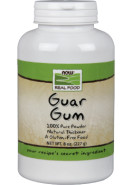 100% PURE GUAR GUM FROM NOW FOODS Now Foods Guar Gum is a thickening agent derived from guar beans that has enjoyed much use in various baking applications. Guar Gum is primarily used in hypoallergenic recipes that use different types of whole grain flours. Now Guar Gum works by thickening the dough to the proper consistency to preven...100% PURE GUAR GUM FROM NOW FOODS Now Foods Guar Gum is a thickening agent derived from guar beans that has enjoyed much use in various baking applications. Guar Gum is primarily used in hypoallergenic recipes that use different types of whole grain flours. Now Guar Gum works by thickening the dough to the proper consistency to prevent the escape of gas released by leavening. It is especially useful as a binder in gluten-free baking. [POWDER]+ Earn 11 Reward Points
100% PURE GUAR GUM FROM NOW FOODS Now Foods Guar Gum is a thickening agent derived from guar beans that has enjoyed much use in various baking applications. Guar Gum is primarily used in hypoallergenic recipes that use different types of whole grain flours. Now Guar Gum works by thickening the dough to the proper consistency to preven...100% PURE GUAR GUM FROM NOW FOODS Now Foods Guar Gum is a thickening agent derived from guar beans that has enjoyed much use in various baking applications. Guar Gum is primarily used in hypoallergenic recipes that use different types of whole grain flours. Now Guar Gum works by thickening the dough to the proper consistency to prevent the escape of gas released by leavening. It is especially useful as a binder in gluten-free baking. [POWDER]+ Earn 11 Reward PointsSale: $11.99
Reg.: $15.99 (Save $4.00)
In Stock -
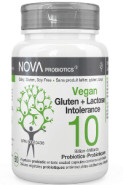 100% VEGAN FORMULA PROBIOTIC Nova Probiotics’ Vegan Gluten + Lactose Intolerance is designed for individuals with food sensitivities such as gluten and lactose intolerance. One capsule provides 10 billion live-microorganisms in the gut to promote healthy intestinal flora balance. Vegan Gluten + Lactose Intolerance is made to ass...100% VEGAN FORMULA PROBIOTIC Nova Probiotics’ Vegan Gluten + Lactose Intolerance is designed for individuals with food sensitivities such as gluten and lactose intolerance. One capsule provides 10 billion live-microorganisms in the gut to promote healthy intestinal flora balance. Vegan Gluten + Lactose Intolerance is made to assist proper digestion and break down of lactose, casein and gluten, improve digestibility and assimilation of essential nutrients and minerals, boost your energy level and prevent bad bacteria from sticking to the lining of the gut. [VCAPS]+ Earn 43 Reward Points
100% VEGAN FORMULA PROBIOTIC Nova Probiotics’ Vegan Gluten + Lactose Intolerance is designed for individuals with food sensitivities such as gluten and lactose intolerance. One capsule provides 10 billion live-microorganisms in the gut to promote healthy intestinal flora balance. Vegan Gluten + Lactose Intolerance is made to ass...100% VEGAN FORMULA PROBIOTIC Nova Probiotics’ Vegan Gluten + Lactose Intolerance is designed for individuals with food sensitivities such as gluten and lactose intolerance. One capsule provides 10 billion live-microorganisms in the gut to promote healthy intestinal flora balance. Vegan Gluten + Lactose Intolerance is made to assist proper digestion and break down of lactose, casein and gluten, improve digestibility and assimilation of essential nutrients and minerals, boost your energy level and prevent bad bacteria from sticking to the lining of the gut. [VCAPS]+ Earn 43 Reward PointsSale: $43.69
Reg.: $54.99 (Save $11.30)
In Stock -
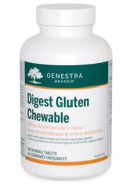 Digest Gluten is a chewable formula that supports gluten intolerance and makes digestion better when eating foods containing traces of gluten. This formula is made with Tolerase G Prolyl Endopeptidase and without dairy, gluten GMOs and is suitable for vegans. Delicious cherry-berry flavour chew tabs are high quality because Genest...Digest Gluten is a chewable formula that supports gluten intolerance and makes digestion better when eating foods containing traces of gluten. This formula is made with Tolerase G Prolyl Endopeptidase and without dairy, gluten GMOs and is suitable for vegans. Delicious cherry-berry flavour chew tabs are high quality because Genestra tests their supplements three times to meet Canadian, European and USA's quality control standards. [CHEW TABS]+ Earn 47 Reward PointsOur Price: $47.75
Digest Gluten is a chewable formula that supports gluten intolerance and makes digestion better when eating foods containing traces of gluten. This formula is made with Tolerase G Prolyl Endopeptidase and without dairy, gluten GMOs and is suitable for vegans. Delicious cherry-berry flavour chew tabs are high quality because Genest...Digest Gluten is a chewable formula that supports gluten intolerance and makes digestion better when eating foods containing traces of gluten. This formula is made with Tolerase G Prolyl Endopeptidase and without dairy, gluten GMOs and is suitable for vegans. Delicious cherry-berry flavour chew tabs are high quality because Genestra tests their supplements three times to meet Canadian, European and USA's quality control standards. [CHEW TABS]+ Earn 47 Reward PointsOur Price: $47.75 -
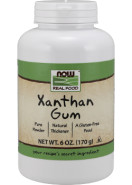 100% PURE XANTHAN GUM FROM NOW FOODS Now Foods Xanthan Gum is a soluble fiber produced from the pure culture fermentation of the microorganism Xanthomonas campestris. It is used in the food processing industry as a thickener, stabilizer and emulsifier for a number of different foods. [POWDER]100% PURE XANTHAN GUM FROM NOW FOODS Now Foods Xanthan Gum is a soluble fiber produced from the pure culture fermentation of the microorganism Xanthomonas campestris. It is used in the food processing industry as a thickener, stabilizer and emulsifier for a number of different foods. [POWDER]+ Earn 14 Reward Points
100% PURE XANTHAN GUM FROM NOW FOODS Now Foods Xanthan Gum is a soluble fiber produced from the pure culture fermentation of the microorganism Xanthomonas campestris. It is used in the food processing industry as a thickener, stabilizer and emulsifier for a number of different foods. [POWDER]100% PURE XANTHAN GUM FROM NOW FOODS Now Foods Xanthan Gum is a soluble fiber produced from the pure culture fermentation of the microorganism Xanthomonas campestris. It is used in the food processing industry as a thickener, stabilizer and emulsifier for a number of different foods. [POWDER]+ Earn 14 Reward PointsSale: $14.99
Reg.: $17.99 (Save $3.00)
Out of Stock -
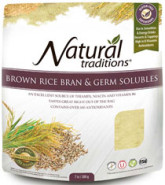 ONE OF NATURE'S MOST NUTRITIOUS FOODS! Brwon Rice Bran and Germ are high in potassium and an excellent source of thiamin, niacin and vitamin B6. This is a low glycemic, lactose and gluten free nutrient dense superfood! Contains vitamins, minerals, essential fatty acids, amino acids and over 110 known antioxidants. ORAC value of 5,740 ...ONE OF NATURE'S MOST NUTRITIOUS FOODS! Brwon Rice Bran and Germ are high in potassium and an excellent source of thiamin, niacin and vitamin B6. This is a low glycemic, lactose and gluten free nutrient dense superfood! Contains vitamins, minerals, essential fatty acids, amino acids and over 110 known antioxidants. ORAC value of 5,740 per serving! [POWDER]+ Earn 10 Reward Points
ONE OF NATURE'S MOST NUTRITIOUS FOODS! Brwon Rice Bran and Germ are high in potassium and an excellent source of thiamin, niacin and vitamin B6. This is a low glycemic, lactose and gluten free nutrient dense superfood! Contains vitamins, minerals, essential fatty acids, amino acids and over 110 known antioxidants. ORAC value of 5,740 ...ONE OF NATURE'S MOST NUTRITIOUS FOODS! Brwon Rice Bran and Germ are high in potassium and an excellent source of thiamin, niacin and vitamin B6. This is a low glycemic, lactose and gluten free nutrient dense superfood! Contains vitamins, minerals, essential fatty acids, amino acids and over 110 known antioxidants. ORAC value of 5,740 per serving! [POWDER]+ Earn 10 Reward PointsSale: $10.99
Reg.: $12.99 (Save $2.00)
Out of Stock
Understanding Gluten Intolerance: Unraveling the Basics
Gluten is a combination of two proteins – gliadin and glutenin – commonly found in the endosperm (the inside) of certain grains, predominantly wheat, barley, and rye. It is crucial in providing elasticity and structure to the dough, so it is commonly found in many types of bread, pasta, and other baked goods. Unfortunately, some individuals have an intolerance or an allergy to gluten, varying from mild to severe. And while these are related conditions, it's essential to be able to distinguish between the two, as they have different underlying mechanisms and effects.
What is Gluten Intolerance?
Gluten intolerance, also known as non-celiac gluten sensitivity, is a condition wherein people experience adverse reactions after consuming gluten-containing foods. It is distinct from celiac disease, which is an autoimmune disorder where the immune system responds abnormally to gluten, attacking the small intestine's lining. Over time, this can damage the intestinal villi, finger-like projections responsible for nutrient absorption. Celiac disease requires strict, lifelong adherence to a gluten-free diet, as even tiny amounts of gluten can trigger symptoms and perpetuate the damage.
Gluten intolerance, on the other hand, does not involve an autoimmune response or severe damage to the small intestine. However, individuals with gluten intolerance may still experience a range of uncomfortable symptoms after consuming gluten, including abdominal pain, bloating, gas, diarrhea, or constipation, fatigue and weakness, migraines or tension headaches, skin problems, joint and muscle pain, and mood disturbances like depression, anxiety, or irritability. The exact cause of gluten intolerance is not yet fully understood, but it is believed to involve a combination of genetic, immunological, and environmental factors.
Recognizing Gluten Intolerance
Diagnosing gluten intolerance can be challenging since the symptoms can overlap with many other conditions. It is essential to rule out celiac disease and wheat allergies before confirming gluten intolerance. A knowledgeable healthcare provider can help you with this.
Once you have a diagnosis in hand, you’ll need to adopt and strictly adhere to a gluten-free diet. This involves avoiding foods that contain wheat, barley, rye, and related grains. Fortunately, gluten-free alternatives are widely available, and many individuals find relief once they adopt a gluten-free lifestyle. Supplements can also help.
Gluten Intolerance Support Supplements
Many supplements can complement a gluten-free diet and help ease the symptoms of gluten sensitivity. These include digestive enzymes, essential fatty acids, multi-vitamin/mineral blends, probiotics, glutamine, calcium, iron, and vitamins C and D. These can not only help manage gluten intolerance but can also help ensure that individuals living with gluten intolerance or allergy get all of the essential nutrients they need to maintain optimal health and wellness.
While you can get these nutrients in isolated form, a few quality gut health blends that supply all the essentials already exist. Among these are Gluten-Ease from Enzymedica, Vegan Pro Digest from Nova probiotics, and Digest Gluten from Genestra. Always follow label instructions and dosing directions carefully for optimal results.
Gluten-Free Eating 101
A gluten-free diet excludes all gluten and is essential for people with celiac disease, non-celiac gluten sensitivity, or wheat allergy. Here are the basics of a gluten-free diet:
Eliminate all sources of gluten from your diet. This includes foods containing wheat, barley, rye, and their derivatives. Common gluten-containing foods to avoid include:
Wheat-based products: bread, pasta, couscous, flour, and most baked goods.
Barley: malt, malt vinegar, and some cereals.
Rye: found in certain bread, rye beer, and some cereals.
Gluten-Free Grains: Fortunately, there are many gluten-free grains and starches that you can include in your diet. These include:
- Rice
- Corn (maize)
- Quinoa
- Buckwheat
- Millet
- Sorghum
- Gluten-free oats (ensure they are certified gluten-free to avoid cross-contamination)
Fruits and Vegetables: Fresh fruits and vegetables are naturally gluten-free, so they can be enjoyed without any concerns.
Proteins: Meat, fish, poultry, eggs, and legumes (beans, lentils, chickpeas, etc.) are naturally gluten-free and can be included in your diet.
Dairy: Most dairy products, such as milk, cheese, yogurt, and butter, are gluten-free. However, it's essential to check for added ingredients containing gluten, especially in flavoured or processed dairy products.
Processed and Packaged Foods: Be cautious with processed and packaged foods as they might contain hidden sources of gluten, such as sauces, soups, dressings, and certain snacks. Always read the ingredient labels carefully to identify any gluten-containing ingredients.
Gluten-Free Substitutes: There are now numerous gluten-free alternatives available for those with a gluten intolerance, such as gluten-free bread, pasta, and flour. These can be found in many grocery stores and specialty health food stores.
Gluten in Non-Food Products: In some cases, gluten can also be found in non-food products, such as medications, vitamins, and cosmetics. Always check the labels and consult with a healthcare professional if needed.
Back to Top ↑
















